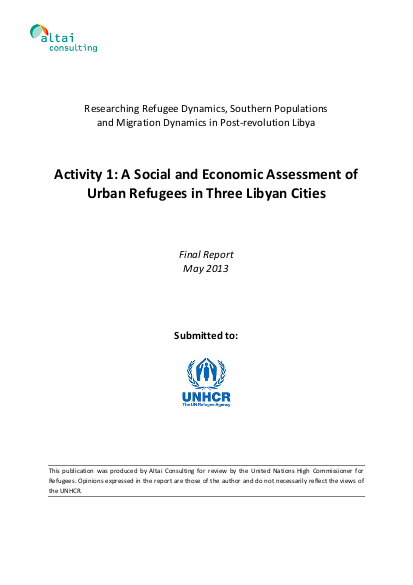Activity 1: A Social and Economic Assessment of Urban Refugees in Three Libyan Cities

The purpose of this study is to identify the demographic, social and economic profiles of urban refugees in three Libyan cities, as well as their coping mechanisms, needs and risks, and to assess changes in these dynamics since the revolution, in order to identify ways for the UNHCR and Libyan government to better support the refugee population in Libya. Data was collected through secondary research and primary quantitative and qualitative research in the form of in-depth interviews (IDIs) and quantitative questionnaires. A total of 401 quantitative questionnaires and 81 IDIs were conducted in Tripoli, Benghazi and Misrata. These interviews were organized around six areas of interest: background, household information, socio-economic status, expectations, coping mechanisms and needs and risks. The research centred on refugees from the following seven countries of origin: Eritrea, Ethiopia, Iraq, Palestine, Somalia, Sudan and Syria.
Resource collections
- Evaluating humanitarian action
- Monitoring and Evaluation (M&E)
- Monitoring of humanitarian action
- UN Habitat - Urban Response Collection
- Urban Response - Urban Crisis Preparedness and Risk Reduction
- Urban Response Collection - Community Engagement and Social Cohesion
- Urban Response Collection - Economic Recovery
- Urban Response Collection - Environment and Climate Change
- Urban Response Collection - Housing, Land and Property
- Urban Response Collection - Urban Crisis Response, Recovery and Reconstruction
- Urban Response Collection - Urban Resilience
- Use of evaluation evidence